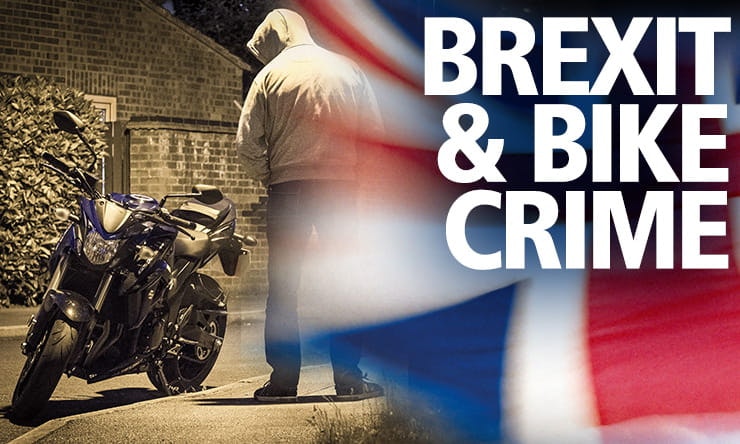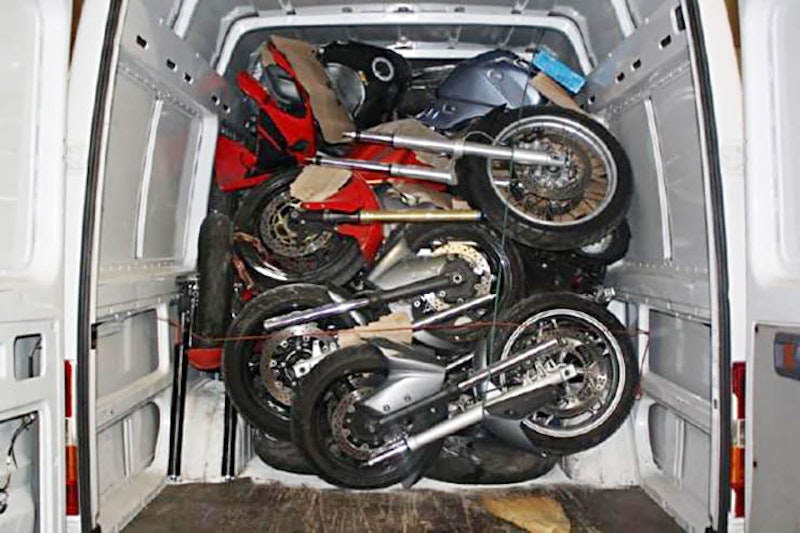‘No deal’ Brexit could impact bike crime
By Dr Ken German
Motorcycle Journalist and Ex Flying Squad
21.08.2018
About 32,000 motorcycles and scooters were stolen in the UK in 2017, and only about half of them were recovered.
But those numbers are dropping – London’s Metropolitan Police force for instance has had great success with Operation Venice in and around the Home Counties; months of intelligence gathering and a proactive pursuit policy are seeing increasing numbers of arrests and substantial convictions.
In fact, with experience and best practices being shared across the UK’s forces, there’s been a large reduction in the activities of gangs and groups of criminals involved in stealing powered two wheelers. Authorised tactical contacts, ‘safe’ stingers and DNA marking sprays have all helped, and while there’s still a real problem, the figures for this year are looking very encouraging.
Motorcycle trackers have helped see many stolen bikes returned to their owners. For advice on the best products, see our tracker reviews here.
The danger of a ‘no deal’ Brexit
But just as they thought they could be winning the battle, the UK’s Police chiefs are becoming extremely animated over the possibility of a ‘no deal’ Brexit in March 2019, which might make their battle against vehicle crime much harder, with restrictions to Europol and the Schengen Information System (SIS), which was searched 539 million times by British officers in 2017.
Effective policing is all about intelligence – the gathering of information from home and abroad – but if the UK’s police forces aren’t able to access that information as easily, many criminals could slip through the net that’s so effectively been tightening over the past year or so.
The chiefs’ fear – set out in a letter to Home Secretary Sajid Javid – is that a considerable amount of additional resource would be required for policing in order to operate effectively using non-EU tools. They’re also very concerned that public safety could be put at risk as the UK could lose access to its EU crime databases, which would see the country with a significant loss in its operational capacity.
An additional 32 different national security and law enforcement measures that we can now participate in will – according to the EU’s chief Brexit negotiator Michel Barnier – also be withdrawn; these include mutual legal assistance, extradition, passenger name records and joint investigation teams to name a few. With Britain acknowledged as having some of the best intelligence capabilities in the world, Mr Barnier understandably stresses that he does not want this to happen.
UK bike’s are most commonly broken down to feed the ever-hungry spares market
Crime adapts to politics
No deal when leaving the European Union would place thieves traveling from Europe to steal in the UK, and those leaving Britain with stolen machines, subject to greater scrutiny at the borders. A good thing, you might imagine, but the increased fear of being caught in possession of a cloned machine (one that has had its identity changed) has already forced many thieves to turn to stripping their stolen motorcycles into saleable parts.
In consequence, a noticeable increase has been seen in the number of ‘chop shops’ – or ‘slaughters’ – as they’re known in the UK. Here, machines are stripped down, the parts sold in a very professional manner on eBay, Facebook, GumTree and other outlets. Or, as they’re so hard to trace, shipped overseas on pallets.
A campaign started by the David Jamieson, West Midlands Police and Crime Commissioner is seeking the public’s help to let them know of their suspicions. ‘Shop a Chop Shop’ encourages anyone who sees or hears work going on in industrial units late at night or in the early hours of the morning to report it to the police on 101, or via Crimestoppers.
If you see bikes going in to workshops and not coming back out, or large amounts of motorcycle or scooter parts being stored, sometimes in odd places such as shipping containers and other unusual locations, please do report it. Equally, you might see expensive items such as engines and gearboxes left outside workshops; report it.
If you see multiple similar parts from the same seller on offer online – usually at prices much lower than from a dealer – tell the police on 101 or via Crimestoppers; this information is vital, and could be the final piece to a jigsaw that sees a solid conviction.
For the best chance of avoiding your motorcycle being stolen, read our in-depth reviews of chains and locks here. For more portable security, best suited to scooters and mopeds, read our reviews here.
Just a few of the motorcycles stolen from around Europe, and found in Ukraine
Britain’s crimes figures in perspective
Suspects arrested for motorcycle theft (and informants) have suggested that the UK is no longer an easy place to clone motorcycles, as riders have become far more security conscious than any other country in Europe. Datatag for instance – especially its Master system – makes it far easier to check a bike’s provenance.
While 32,000 is a lot, 55,743 motorcycles and scooters were stolen in France last year, forcing some insurance companies in high risk areas such as the Île-de-France, Marseille, Val-d’Oise and Seine-Saint-Denis – which alone lost 4,700 machines in 2017 – to consider refusing theft cover to riders who’d previously reported their bikes stolen.
Italy had 56,120 motorcycles and scooters reported stolen last year, its Rome, Milan and Calabria regions seeing an upsurge in the theft of small and classic machines, some of which have been traced out to Scandinavia and the Middle East.
Spain lost 44,013 motorcycles and scooters in 2017, the worst area for theft being around Madrid, Barcelona and the Malaga to Algeciras regions, the latter being the favourite route for the traffickers to Ceuta, Morocco and Africa – Europol’s main target for many stolen vehicle operations.
Share on social media:

